Reflective Learning Account: ICT80008 Professional Issues in IT
VerifiedAdded on 2023/06/12
|14
|3282
|362
Report
AI Summary
This report presents a reflective learning account on professional issues in IT, detailing the motivating factors for choosing the ICT profession, experiences, and learning from the Professional Skills in IT unit. It highlights the importance of monetary aspects, practical skills, and the desire to become a competent ICT expert. The report also emphasizes the significance of teamwork, integrity, communication, and constructive criticism in ICT groups. It discusses the continuous pursuit of additional knowledge through journals and networking. Key professional roles and responsibilities, such as prioritizing public interests, maintaining competence, and enhancing quality of life, are explored. The report further reflects on ethics, codes of conduct, and group dynamics, emphasizing the collaborative approach and the impact of the unit on the student's understanding of the ICT profession. This document is available on Desklib, a platform offering study tools and resources for students.
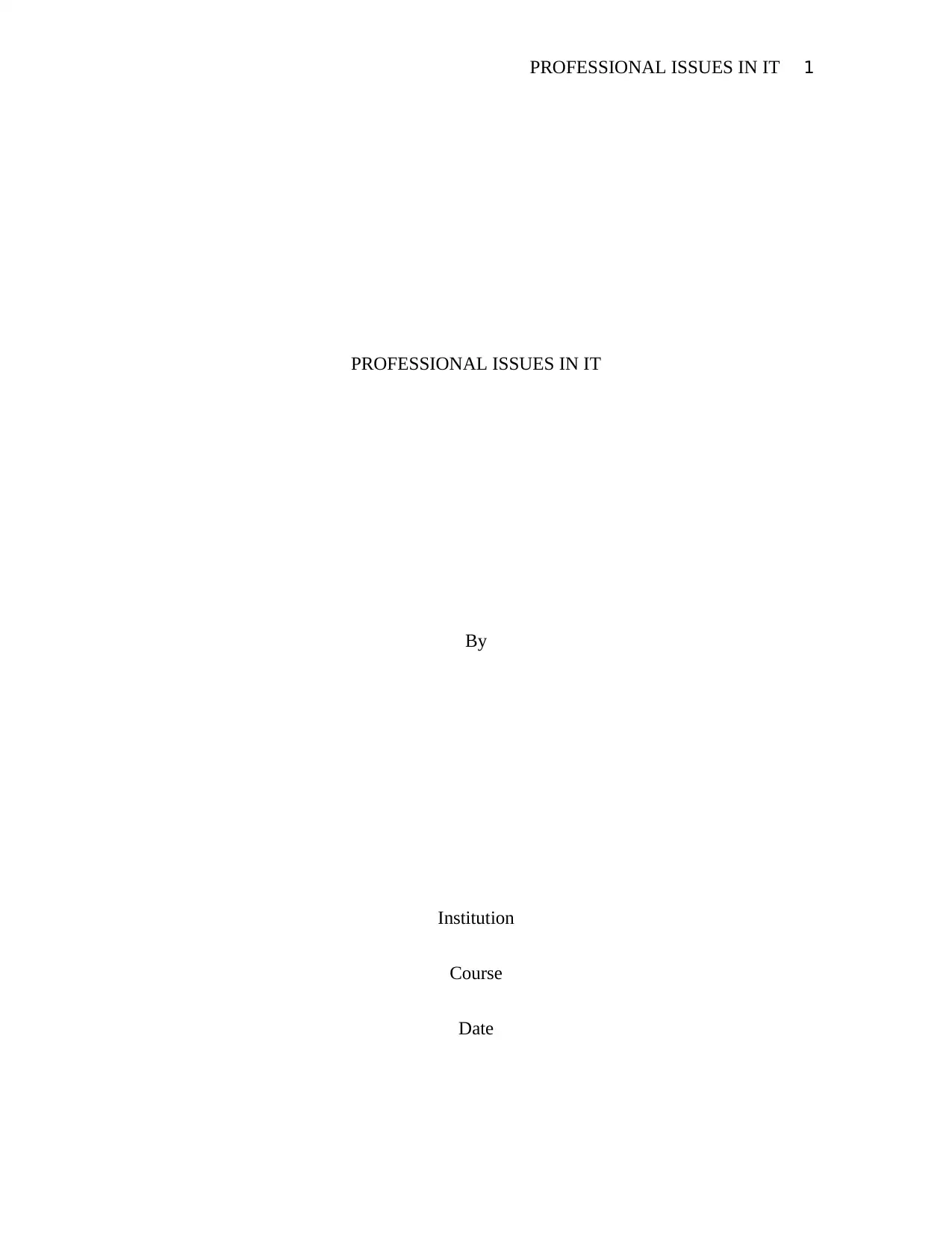
PROFESSIONAL ISSUES IN IT 1
PROFESSIONAL ISSUES IN IT
By
Institution
Course
Date
PROFESSIONAL ISSUES IN IT
By
Institution
Course
Date
Paraphrase This Document
Need a fresh take? Get an instant paraphrase of this document with our AI Paraphraser
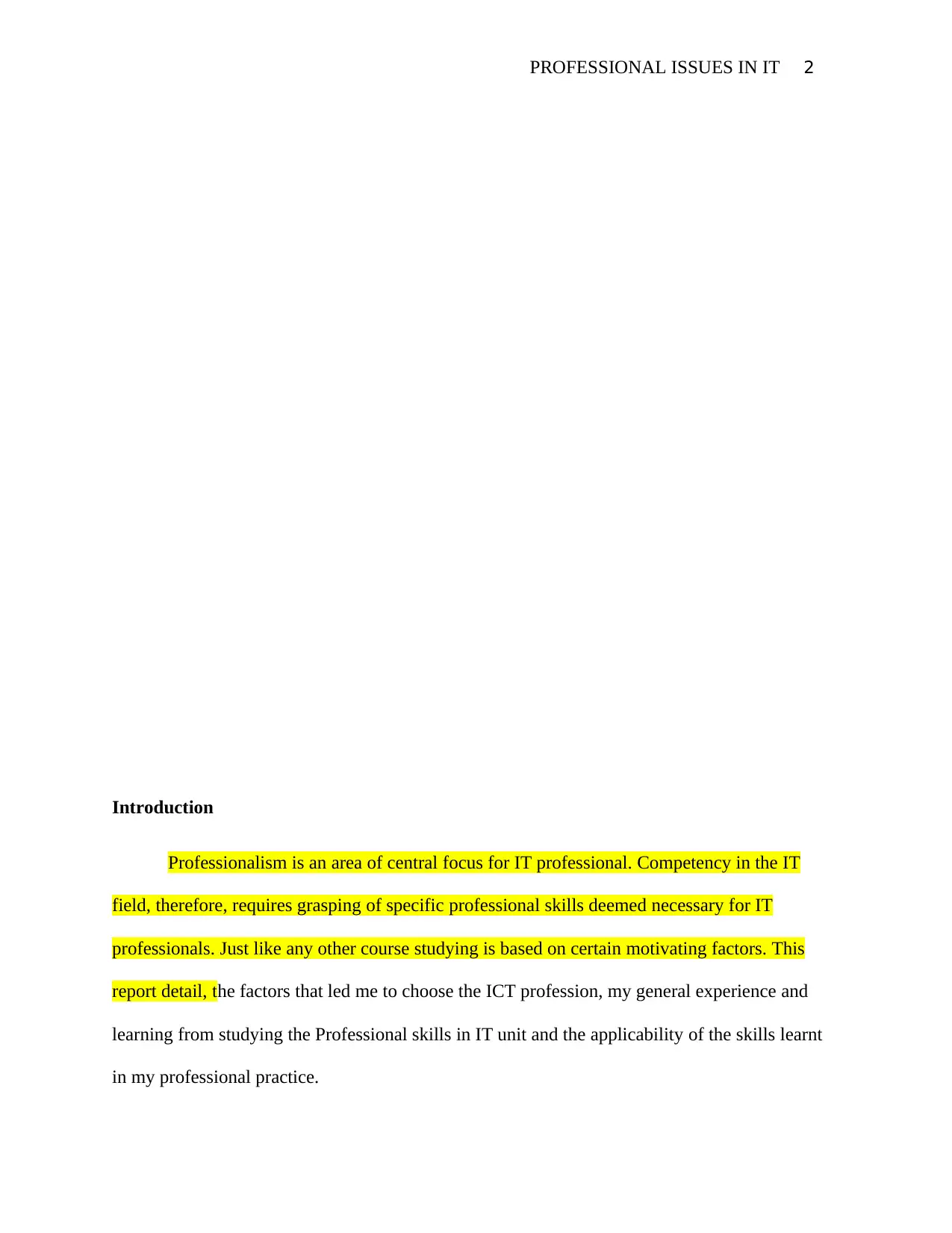
PROFESSIONAL ISSUES IN IT 2
Introduction
Professionalism is an area of central focus for IT professional. Competency in the IT
field, therefore, requires grasping of specific professional skills deemed necessary for IT
professionals. Just like any other course studying is based on certain motivating factors. This
report detail, the factors that led me to choose the ICT profession, my general experience and
learning from studying the Professional skills in IT unit and the applicability of the skills learnt
in my professional practice.
Introduction
Professionalism is an area of central focus for IT professional. Competency in the IT
field, therefore, requires grasping of specific professional skills deemed necessary for IT
professionals. Just like any other course studying is based on certain motivating factors. This
report detail, the factors that led me to choose the ICT profession, my general experience and
learning from studying the Professional skills in IT unit and the applicability of the skills learnt
in my professional practice.
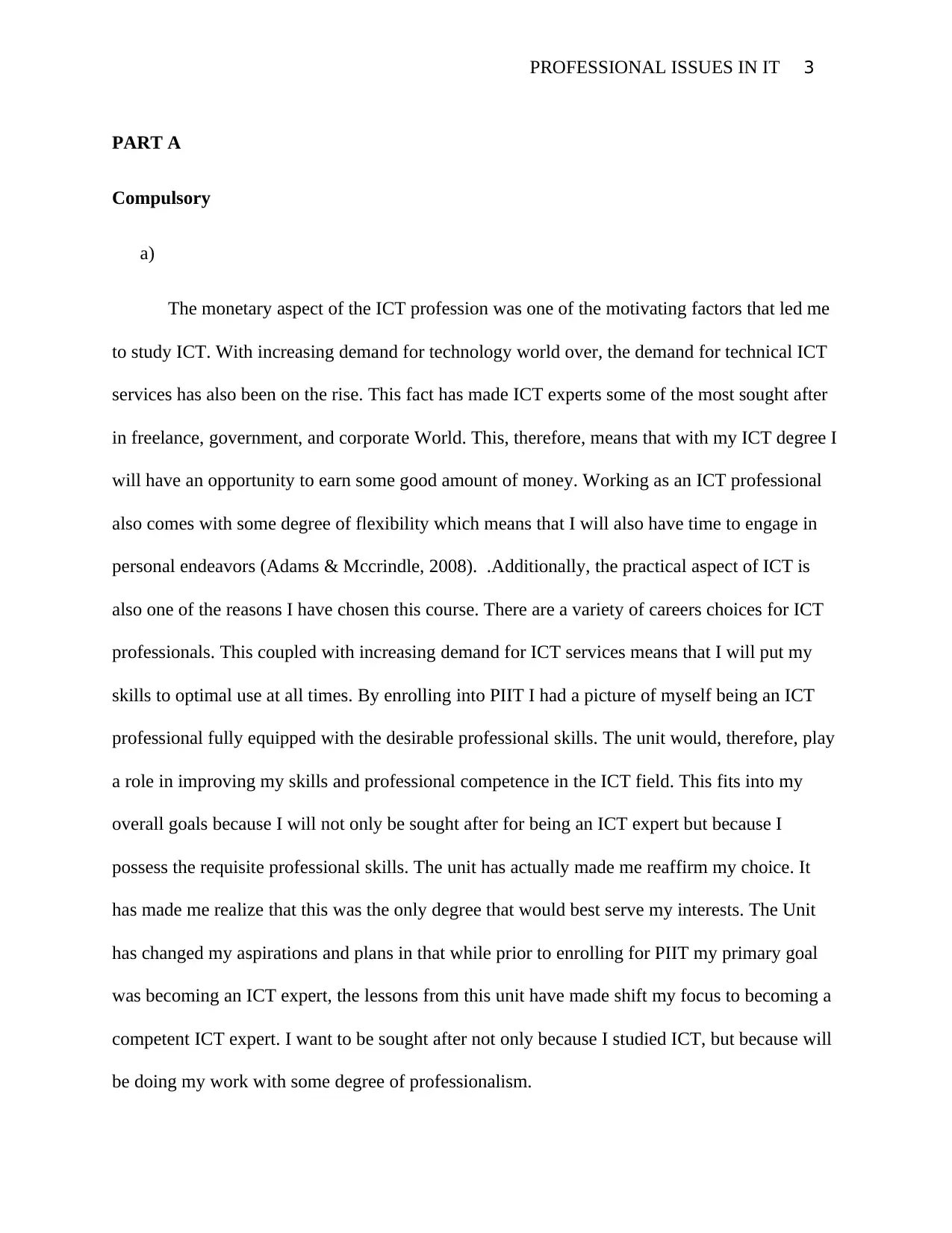
PROFESSIONAL ISSUES IN IT 3
PART A
Compulsory
a)
The monetary aspect of the ICT profession was one of the motivating factors that led me
to study ICT. With increasing demand for technology world over, the demand for technical ICT
services has also been on the rise. This fact has made ICT experts some of the most sought after
in freelance, government, and corporate World. This, therefore, means that with my ICT degree I
will have an opportunity to earn some good amount of money. Working as an ICT professional
also comes with some degree of flexibility which means that I will also have time to engage in
personal endeavors (Adams & Mccrindle, 2008). .Additionally, the practical aspect of ICT is
also one of the reasons I have chosen this course. There are a variety of careers choices for ICT
professionals. This coupled with increasing demand for ICT services means that I will put my
skills to optimal use at all times. By enrolling into PIIT I had a picture of myself being an ICT
professional fully equipped with the desirable professional skills. The unit would, therefore, play
a role in improving my skills and professional competence in the ICT field. This fits into my
overall goals because I will not only be sought after for being an ICT expert but because I
possess the requisite professional skills. The unit has actually made me reaffirm my choice. It
has made me realize that this was the only degree that would best serve my interests. The Unit
has changed my aspirations and plans in that while prior to enrolling for PIIT my primary goal
was becoming an ICT expert, the lessons from this unit have made shift my focus to becoming a
competent ICT expert. I want to be sought after not only because I studied ICT, but because will
be doing my work with some degree of professionalism.
PART A
Compulsory
a)
The monetary aspect of the ICT profession was one of the motivating factors that led me
to study ICT. With increasing demand for technology world over, the demand for technical ICT
services has also been on the rise. This fact has made ICT experts some of the most sought after
in freelance, government, and corporate World. This, therefore, means that with my ICT degree I
will have an opportunity to earn some good amount of money. Working as an ICT professional
also comes with some degree of flexibility which means that I will also have time to engage in
personal endeavors (Adams & Mccrindle, 2008). .Additionally, the practical aspect of ICT is
also one of the reasons I have chosen this course. There are a variety of careers choices for ICT
professionals. This coupled with increasing demand for ICT services means that I will put my
skills to optimal use at all times. By enrolling into PIIT I had a picture of myself being an ICT
professional fully equipped with the desirable professional skills. The unit would, therefore, play
a role in improving my skills and professional competence in the ICT field. This fits into my
overall goals because I will not only be sought after for being an ICT expert but because I
possess the requisite professional skills. The unit has actually made me reaffirm my choice. It
has made me realize that this was the only degree that would best serve my interests. The Unit
has changed my aspirations and plans in that while prior to enrolling for PIIT my primary goal
was becoming an ICT expert, the lessons from this unit have made shift my focus to becoming a
competent ICT expert. I want to be sought after not only because I studied ICT, but because will
be doing my work with some degree of professionalism.
⊘ This is a preview!⊘
Do you want full access?
Subscribe today to unlock all pages.

Trusted by 1+ million students worldwide
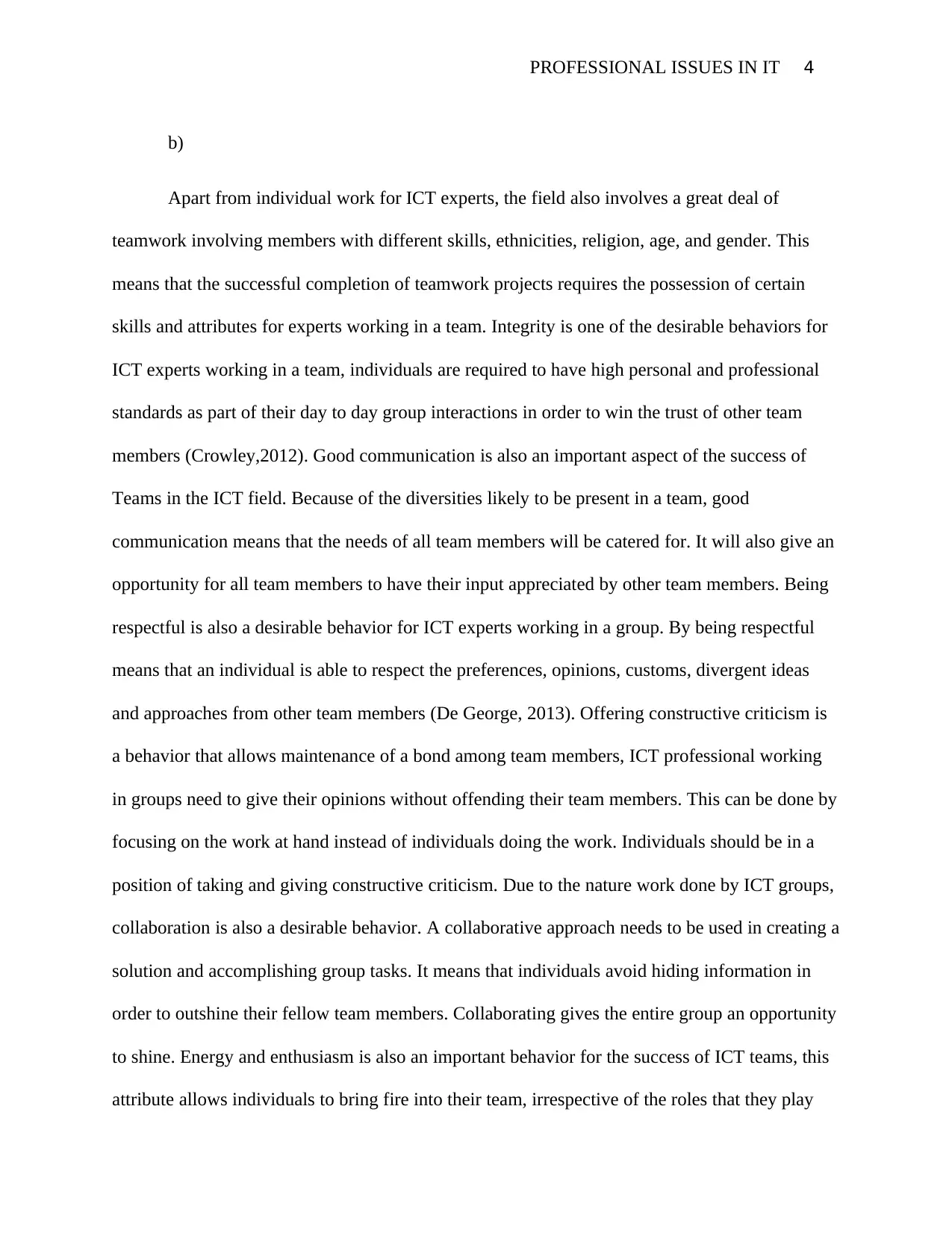
PROFESSIONAL ISSUES IN IT 4
b)
Apart from individual work for ICT experts, the field also involves a great deal of
teamwork involving members with different skills, ethnicities, religion, age, and gender. This
means that the successful completion of teamwork projects requires the possession of certain
skills and attributes for experts working in a team. Integrity is one of the desirable behaviors for
ICT experts working in a team, individuals are required to have high personal and professional
standards as part of their day to day group interactions in order to win the trust of other team
members (Crowley,2012). Good communication is also an important aspect of the success of
Teams in the ICT field. Because of the diversities likely to be present in a team, good
communication means that the needs of all team members will be catered for. It will also give an
opportunity for all team members to have their input appreciated by other team members. Being
respectful is also a desirable behavior for ICT experts working in a group. By being respectful
means that an individual is able to respect the preferences, opinions, customs, divergent ideas
and approaches from other team members (De George, 2013). Offering constructive criticism is
a behavior that allows maintenance of a bond among team members, ICT professional working
in groups need to give their opinions without offending their team members. This can be done by
focusing on the work at hand instead of individuals doing the work. Individuals should be in a
position of taking and giving constructive criticism. Due to the nature work done by ICT groups,
collaboration is also a desirable behavior. A collaborative approach needs to be used in creating a
solution and accomplishing group tasks. It means that individuals avoid hiding information in
order to outshine their fellow team members. Collaborating gives the entire group an opportunity
to shine. Energy and enthusiasm is also an important behavior for the success of ICT teams, this
attribute allows individuals to bring fire into their team, irrespective of the roles that they play
b)
Apart from individual work for ICT experts, the field also involves a great deal of
teamwork involving members with different skills, ethnicities, religion, age, and gender. This
means that the successful completion of teamwork projects requires the possession of certain
skills and attributes for experts working in a team. Integrity is one of the desirable behaviors for
ICT experts working in a team, individuals are required to have high personal and professional
standards as part of their day to day group interactions in order to win the trust of other team
members (Crowley,2012). Good communication is also an important aspect of the success of
Teams in the ICT field. Because of the diversities likely to be present in a team, good
communication means that the needs of all team members will be catered for. It will also give an
opportunity for all team members to have their input appreciated by other team members. Being
respectful is also a desirable behavior for ICT experts working in a group. By being respectful
means that an individual is able to respect the preferences, opinions, customs, divergent ideas
and approaches from other team members (De George, 2013). Offering constructive criticism is
a behavior that allows maintenance of a bond among team members, ICT professional working
in groups need to give their opinions without offending their team members. This can be done by
focusing on the work at hand instead of individuals doing the work. Individuals should be in a
position of taking and giving constructive criticism. Due to the nature work done by ICT groups,
collaboration is also a desirable behavior. A collaborative approach needs to be used in creating a
solution and accomplishing group tasks. It means that individuals avoid hiding information in
order to outshine their fellow team members. Collaborating gives the entire group an opportunity
to shine. Energy and enthusiasm is also an important behavior for the success of ICT teams, this
attribute allows individuals to bring fire into their team, irrespective of the roles that they play
Paraphrase This Document
Need a fresh take? Get an instant paraphrase of this document with our AI Paraphraser
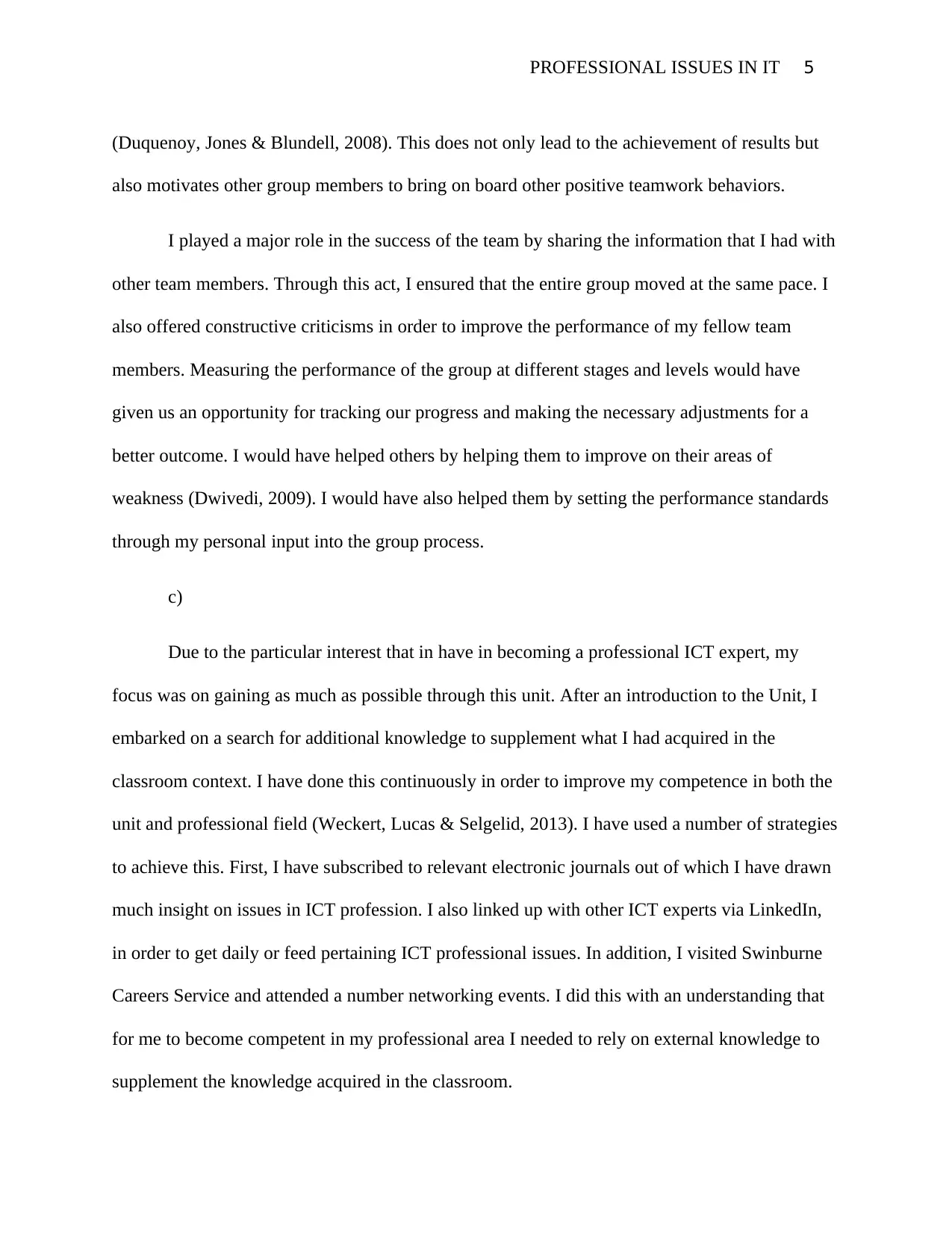
PROFESSIONAL ISSUES IN IT 5
(Duquenoy, Jones & Blundell, 2008). This does not only lead to the achievement of results but
also motivates other group members to bring on board other positive teamwork behaviors.
I played a major role in the success of the team by sharing the information that I had with
other team members. Through this act, I ensured that the entire group moved at the same pace. I
also offered constructive criticisms in order to improve the performance of my fellow team
members. Measuring the performance of the group at different stages and levels would have
given us an opportunity for tracking our progress and making the necessary adjustments for a
better outcome. I would have helped others by helping them to improve on their areas of
weakness (Dwivedi, 2009). I would have also helped them by setting the performance standards
through my personal input into the group process.
c)
Due to the particular interest that in have in becoming a professional ICT expert, my
focus was on gaining as much as possible through this unit. After an introduction to the Unit, I
embarked on a search for additional knowledge to supplement what I had acquired in the
classroom context. I have done this continuously in order to improve my competence in both the
unit and professional field (Weckert, Lucas & Selgelid, 2013). I have used a number of strategies
to achieve this. First, I have subscribed to relevant electronic journals out of which I have drawn
much insight on issues in ICT profession. I also linked up with other ICT experts via LinkedIn,
in order to get daily or feed pertaining ICT professional issues. In addition, I visited Swinburne
Careers Service and attended a number networking events. I did this with an understanding that
for me to become competent in my professional area I needed to rely on external knowledge to
supplement the knowledge acquired in the classroom.
(Duquenoy, Jones & Blundell, 2008). This does not only lead to the achievement of results but
also motivates other group members to bring on board other positive teamwork behaviors.
I played a major role in the success of the team by sharing the information that I had with
other team members. Through this act, I ensured that the entire group moved at the same pace. I
also offered constructive criticisms in order to improve the performance of my fellow team
members. Measuring the performance of the group at different stages and levels would have
given us an opportunity for tracking our progress and making the necessary adjustments for a
better outcome. I would have helped others by helping them to improve on their areas of
weakness (Dwivedi, 2009). I would have also helped them by setting the performance standards
through my personal input into the group process.
c)
Due to the particular interest that in have in becoming a professional ICT expert, my
focus was on gaining as much as possible through this unit. After an introduction to the Unit, I
embarked on a search for additional knowledge to supplement what I had acquired in the
classroom context. I have done this continuously in order to improve my competence in both the
unit and professional field (Weckert, Lucas & Selgelid, 2013). I have used a number of strategies
to achieve this. First, I have subscribed to relevant electronic journals out of which I have drawn
much insight on issues in ICT profession. I also linked up with other ICT experts via LinkedIn,
in order to get daily or feed pertaining ICT professional issues. In addition, I visited Swinburne
Careers Service and attended a number networking events. I did this with an understanding that
for me to become competent in my professional area I needed to rely on external knowledge to
supplement the knowledge acquired in the classroom.
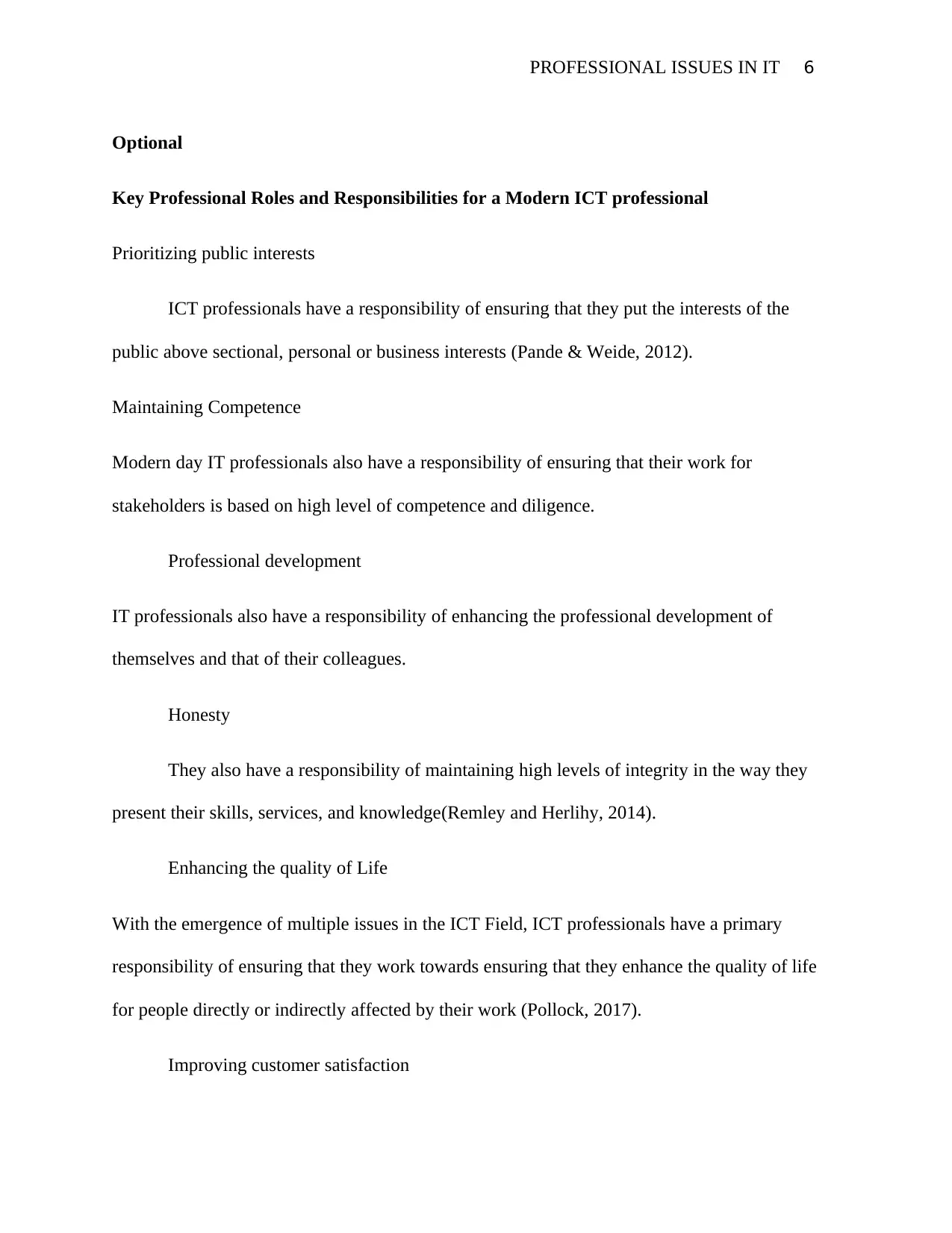
PROFESSIONAL ISSUES IN IT 6
Optional
Key Professional Roles and Responsibilities for a Modern ICT professional
Prioritizing public interests
ICT professionals have a responsibility of ensuring that they put the interests of the
public above sectional, personal or business interests (Pande & Weide, 2012).
Maintaining Competence
Modern day IT professionals also have a responsibility of ensuring that their work for
stakeholders is based on high level of competence and diligence.
Professional development
IT professionals also have a responsibility of enhancing the professional development of
themselves and that of their colleagues.
Honesty
They also have a responsibility of maintaining high levels of integrity in the way they
present their skills, services, and knowledge(Remley and Herlihy, 2014).
Enhancing the quality of Life
With the emergence of multiple issues in the ICT Field, ICT professionals have a primary
responsibility of ensuring that they work towards ensuring that they enhance the quality of life
for people directly or indirectly affected by their work (Pollock, 2017).
Improving customer satisfaction
Optional
Key Professional Roles and Responsibilities for a Modern ICT professional
Prioritizing public interests
ICT professionals have a responsibility of ensuring that they put the interests of the
public above sectional, personal or business interests (Pande & Weide, 2012).
Maintaining Competence
Modern day IT professionals also have a responsibility of ensuring that their work for
stakeholders is based on high level of competence and diligence.
Professional development
IT professionals also have a responsibility of enhancing the professional development of
themselves and that of their colleagues.
Honesty
They also have a responsibility of maintaining high levels of integrity in the way they
present their skills, services, and knowledge(Remley and Herlihy, 2014).
Enhancing the quality of Life
With the emergence of multiple issues in the ICT Field, ICT professionals have a primary
responsibility of ensuring that they work towards ensuring that they enhance the quality of life
for people directly or indirectly affected by their work (Pollock, 2017).
Improving customer satisfaction
⊘ This is a preview!⊘
Do you want full access?
Subscribe today to unlock all pages.

Trusted by 1+ million students worldwide
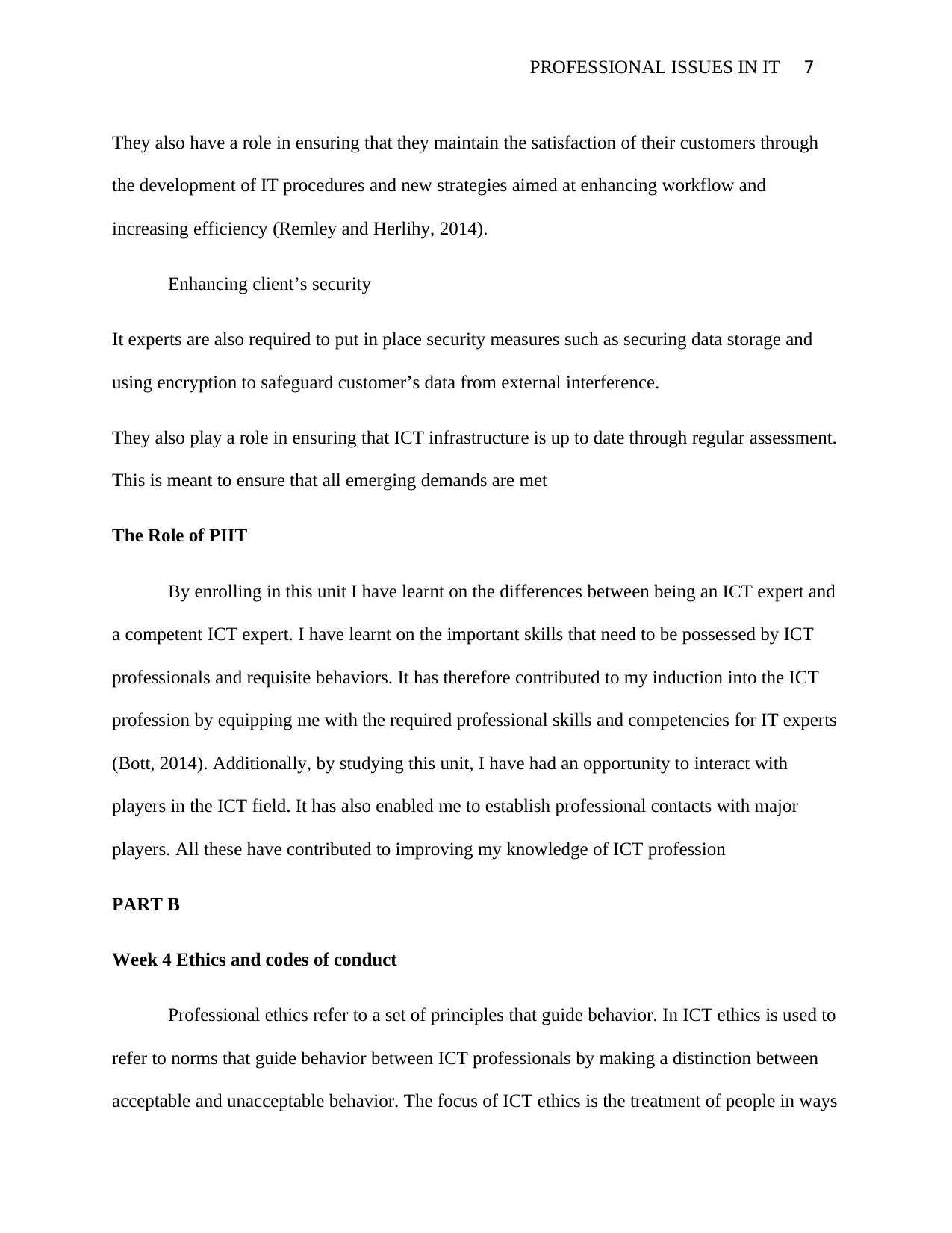
PROFESSIONAL ISSUES IN IT 7
They also have a role in ensuring that they maintain the satisfaction of their customers through
the development of IT procedures and new strategies aimed at enhancing workflow and
increasing efficiency (Remley and Herlihy, 2014).
Enhancing client’s security
It experts are also required to put in place security measures such as securing data storage and
using encryption to safeguard customer’s data from external interference.
They also play a role in ensuring that ICT infrastructure is up to date through regular assessment.
This is meant to ensure that all emerging demands are met
The Role of PIIT
By enrolling in this unit I have learnt on the differences between being an ICT expert and
a competent ICT expert. I have learnt on the important skills that need to be possessed by ICT
professionals and requisite behaviors. It has therefore contributed to my induction into the ICT
profession by equipping me with the required professional skills and competencies for IT experts
(Bott, 2014). Additionally, by studying this unit, I have had an opportunity to interact with
players in the ICT field. It has also enabled me to establish professional contacts with major
players. All these have contributed to improving my knowledge of ICT profession
PART B
Week 4 Ethics and codes of conduct
Professional ethics refer to a set of principles that guide behavior. In ICT ethics is used to
refer to norms that guide behavior between ICT professionals by making a distinction between
acceptable and unacceptable behavior. The focus of ICT ethics is the treatment of people in ways
They also have a role in ensuring that they maintain the satisfaction of their customers through
the development of IT procedures and new strategies aimed at enhancing workflow and
increasing efficiency (Remley and Herlihy, 2014).
Enhancing client’s security
It experts are also required to put in place security measures such as securing data storage and
using encryption to safeguard customer’s data from external interference.
They also play a role in ensuring that ICT infrastructure is up to date through regular assessment.
This is meant to ensure that all emerging demands are met
The Role of PIIT
By enrolling in this unit I have learnt on the differences between being an ICT expert and
a competent ICT expert. I have learnt on the important skills that need to be possessed by ICT
professionals and requisite behaviors. It has therefore contributed to my induction into the ICT
profession by equipping me with the required professional skills and competencies for IT experts
(Bott, 2014). Additionally, by studying this unit, I have had an opportunity to interact with
players in the ICT field. It has also enabled me to establish professional contacts with major
players. All these have contributed to improving my knowledge of ICT profession
PART B
Week 4 Ethics and codes of conduct
Professional ethics refer to a set of principles that guide behavior. In ICT ethics is used to
refer to norms that guide behavior between ICT professionals by making a distinction between
acceptable and unacceptable behavior. The focus of ICT ethics is the treatment of people in ways
Paraphrase This Document
Need a fresh take? Get an instant paraphrase of this document with our AI Paraphraser
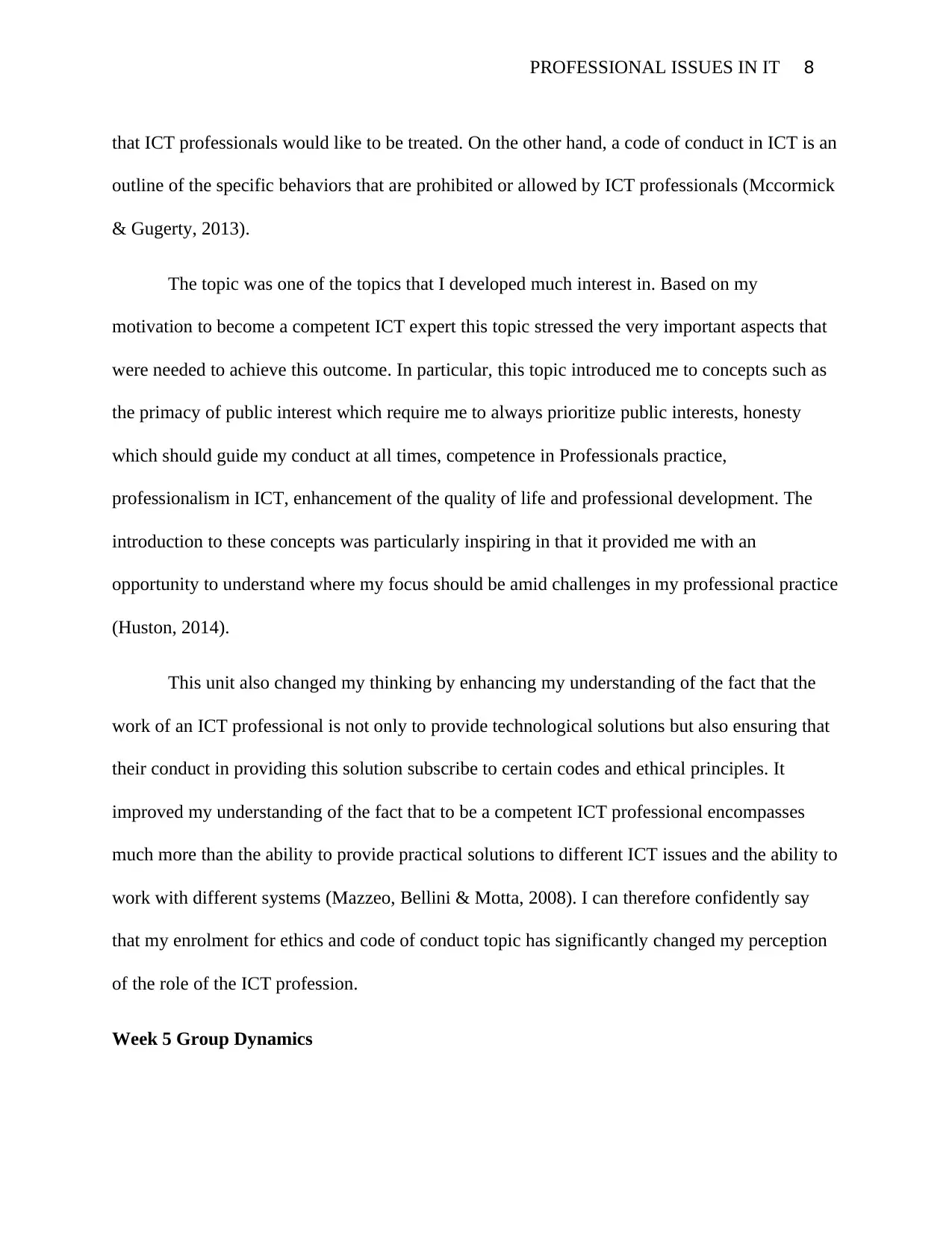
PROFESSIONAL ISSUES IN IT 8
that ICT professionals would like to be treated. On the other hand, a code of conduct in ICT is an
outline of the specific behaviors that are prohibited or allowed by ICT professionals (Mccormick
& Gugerty, 2013).
The topic was one of the topics that I developed much interest in. Based on my
motivation to become a competent ICT expert this topic stressed the very important aspects that
were needed to achieve this outcome. In particular, this topic introduced me to concepts such as
the primacy of public interest which require me to always prioritize public interests, honesty
which should guide my conduct at all times, competence in Professionals practice,
professionalism in ICT, enhancement of the quality of life and professional development. The
introduction to these concepts was particularly inspiring in that it provided me with an
opportunity to understand where my focus should be amid challenges in my professional practice
(Huston, 2014).
This unit also changed my thinking by enhancing my understanding of the fact that the
work of an ICT professional is not only to provide technological solutions but also ensuring that
their conduct in providing this solution subscribe to certain codes and ethical principles. It
improved my understanding of the fact that to be a competent ICT professional encompasses
much more than the ability to provide practical solutions to different ICT issues and the ability to
work with different systems (Mazzeo, Bellini & Motta, 2008). I can therefore confidently say
that my enrolment for ethics and code of conduct topic has significantly changed my perception
of the role of the ICT profession.
Week 5 Group Dynamics
that ICT professionals would like to be treated. On the other hand, a code of conduct in ICT is an
outline of the specific behaviors that are prohibited or allowed by ICT professionals (Mccormick
& Gugerty, 2013).
The topic was one of the topics that I developed much interest in. Based on my
motivation to become a competent ICT expert this topic stressed the very important aspects that
were needed to achieve this outcome. In particular, this topic introduced me to concepts such as
the primacy of public interest which require me to always prioritize public interests, honesty
which should guide my conduct at all times, competence in Professionals practice,
professionalism in ICT, enhancement of the quality of life and professional development. The
introduction to these concepts was particularly inspiring in that it provided me with an
opportunity to understand where my focus should be amid challenges in my professional practice
(Huston, 2014).
This unit also changed my thinking by enhancing my understanding of the fact that the
work of an ICT professional is not only to provide technological solutions but also ensuring that
their conduct in providing this solution subscribe to certain codes and ethical principles. It
improved my understanding of the fact that to be a competent ICT professional encompasses
much more than the ability to provide practical solutions to different ICT issues and the ability to
work with different systems (Mazzeo, Bellini & Motta, 2008). I can therefore confidently say
that my enrolment for ethics and code of conduct topic has significantly changed my perception
of the role of the ICT profession.
Week 5 Group Dynamics
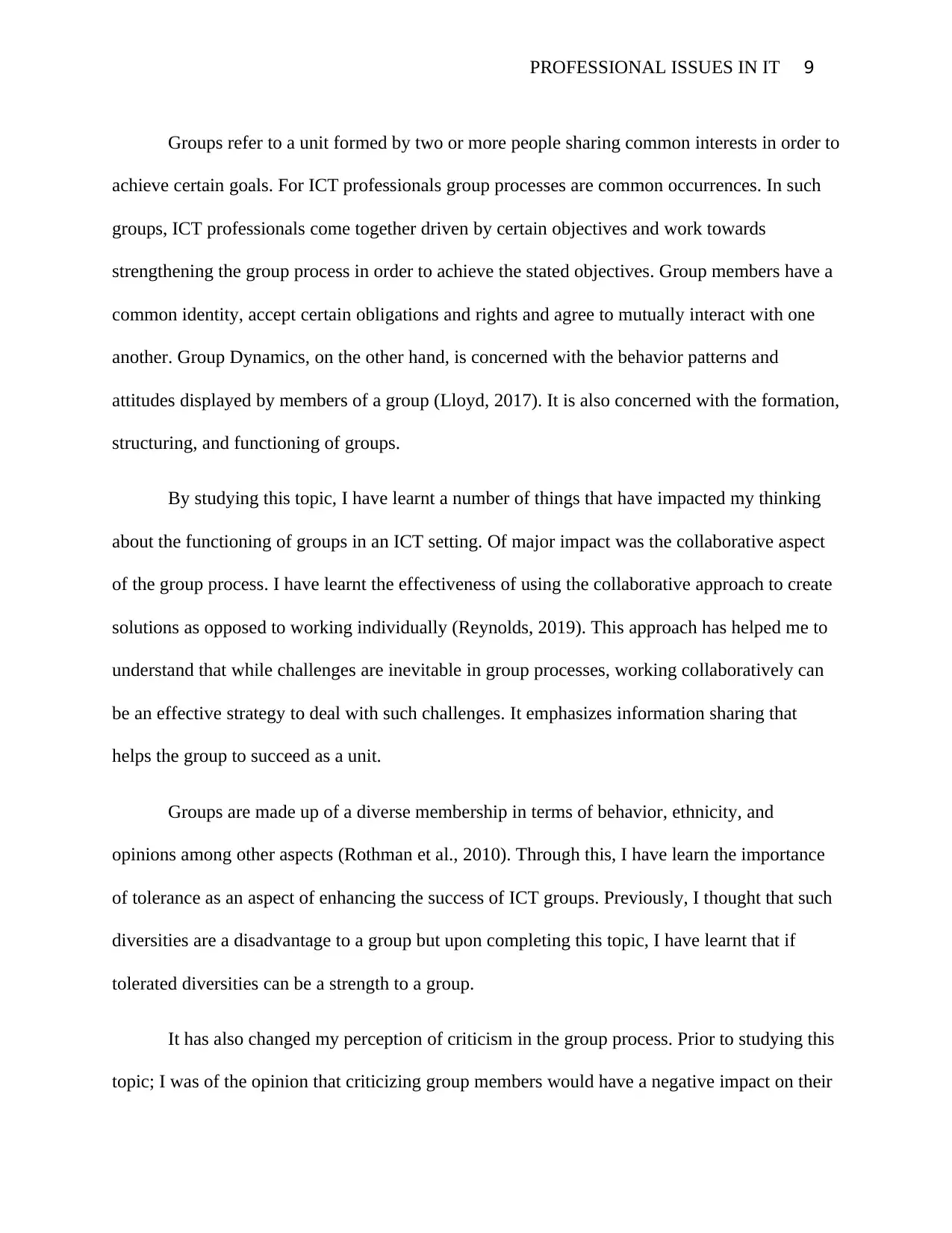
PROFESSIONAL ISSUES IN IT 9
Groups refer to a unit formed by two or more people sharing common interests in order to
achieve certain goals. For ICT professionals group processes are common occurrences. In such
groups, ICT professionals come together driven by certain objectives and work towards
strengthening the group process in order to achieve the stated objectives. Group members have a
common identity, accept certain obligations and rights and agree to mutually interact with one
another. Group Dynamics, on the other hand, is concerned with the behavior patterns and
attitudes displayed by members of a group (Lloyd, 2017). It is also concerned with the formation,
structuring, and functioning of groups.
By studying this topic, I have learnt a number of things that have impacted my thinking
about the functioning of groups in an ICT setting. Of major impact was the collaborative aspect
of the group process. I have learnt the effectiveness of using the collaborative approach to create
solutions as opposed to working individually (Reynolds, 2019). This approach has helped me to
understand that while challenges are inevitable in group processes, working collaboratively can
be an effective strategy to deal with such challenges. It emphasizes information sharing that
helps the group to succeed as a unit.
Groups are made up of a diverse membership in terms of behavior, ethnicity, and
opinions among other aspects (Rothman et al., 2010). Through this, I have learn the importance
of tolerance as an aspect of enhancing the success of ICT groups. Previously, I thought that such
diversities are a disadvantage to a group but upon completing this topic, I have learnt that if
tolerated diversities can be a strength to a group.
It has also changed my perception of criticism in the group process. Prior to studying this
topic; I was of the opinion that criticizing group members would have a negative impact on their
Groups refer to a unit formed by two or more people sharing common interests in order to
achieve certain goals. For ICT professionals group processes are common occurrences. In such
groups, ICT professionals come together driven by certain objectives and work towards
strengthening the group process in order to achieve the stated objectives. Group members have a
common identity, accept certain obligations and rights and agree to mutually interact with one
another. Group Dynamics, on the other hand, is concerned with the behavior patterns and
attitudes displayed by members of a group (Lloyd, 2017). It is also concerned with the formation,
structuring, and functioning of groups.
By studying this topic, I have learnt a number of things that have impacted my thinking
about the functioning of groups in an ICT setting. Of major impact was the collaborative aspect
of the group process. I have learnt the effectiveness of using the collaborative approach to create
solutions as opposed to working individually (Reynolds, 2019). This approach has helped me to
understand that while challenges are inevitable in group processes, working collaboratively can
be an effective strategy to deal with such challenges. It emphasizes information sharing that
helps the group to succeed as a unit.
Groups are made up of a diverse membership in terms of behavior, ethnicity, and
opinions among other aspects (Rothman et al., 2010). Through this, I have learn the importance
of tolerance as an aspect of enhancing the success of ICT groups. Previously, I thought that such
diversities are a disadvantage to a group but upon completing this topic, I have learnt that if
tolerated diversities can be a strength to a group.
It has also changed my perception of criticism in the group process. Prior to studying this
topic; I was of the opinion that criticizing group members would have a negative impact on their
⊘ This is a preview!⊘
Do you want full access?
Subscribe today to unlock all pages.

Trusted by 1+ million students worldwide
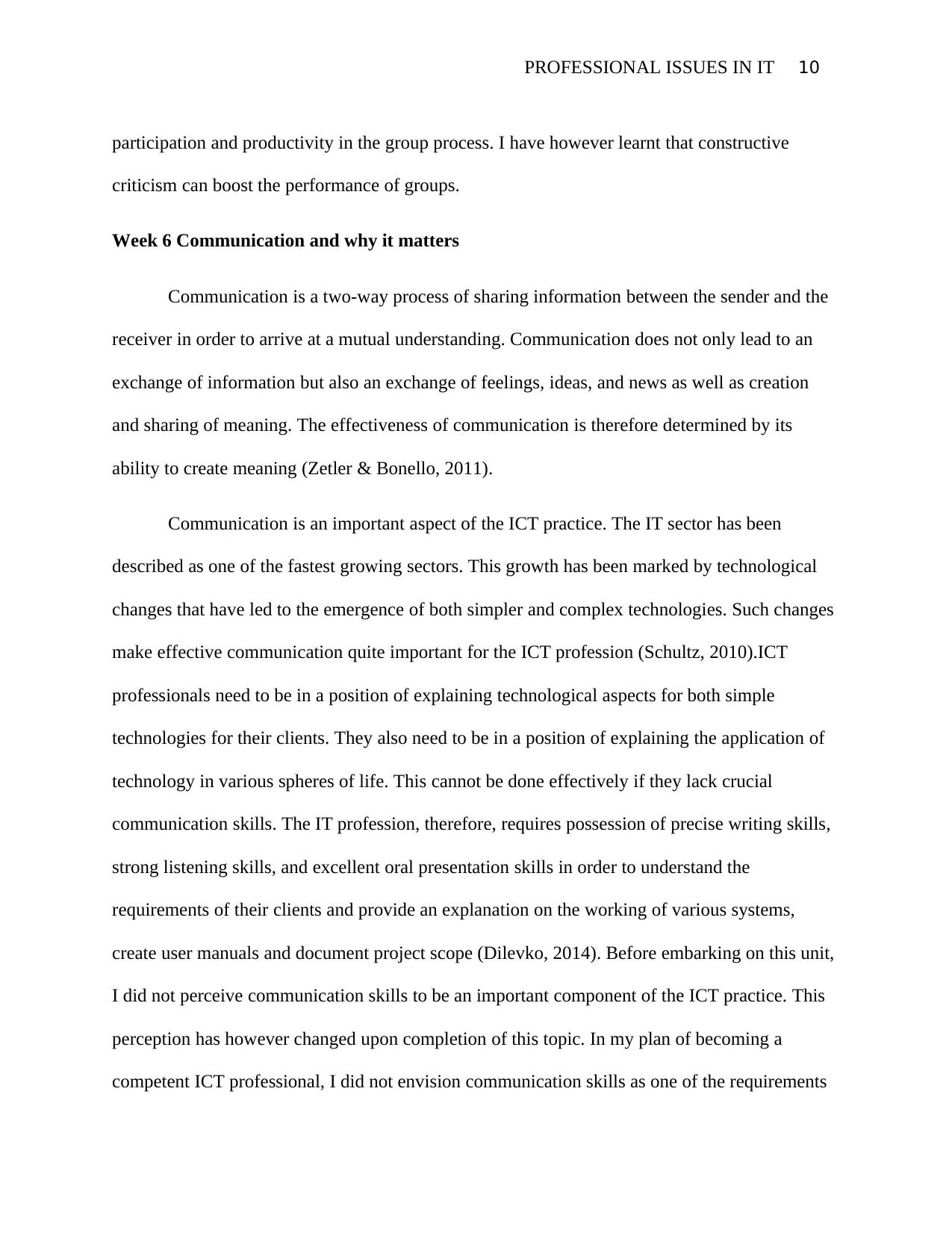
PROFESSIONAL ISSUES IN IT 10
participation and productivity in the group process. I have however learnt that constructive
criticism can boost the performance of groups.
Week 6 Communication and why it matters
Communication is a two-way process of sharing information between the sender and the
receiver in order to arrive at a mutual understanding. Communication does not only lead to an
exchange of information but also an exchange of feelings, ideas, and news as well as creation
and sharing of meaning. The effectiveness of communication is therefore determined by its
ability to create meaning (Zetler & Bonello, 2011).
Communication is an important aspect of the ICT practice. The IT sector has been
described as one of the fastest growing sectors. This growth has been marked by technological
changes that have led to the emergence of both simpler and complex technologies. Such changes
make effective communication quite important for the ICT profession (Schultz, 2010).ICT
professionals need to be in a position of explaining technological aspects for both simple
technologies for their clients. They also need to be in a position of explaining the application of
technology in various spheres of life. This cannot be done effectively if they lack crucial
communication skills. The IT profession, therefore, requires possession of precise writing skills,
strong listening skills, and excellent oral presentation skills in order to understand the
requirements of their clients and provide an explanation on the working of various systems,
create user manuals and document project scope (Dilevko, 2014). Before embarking on this unit,
I did not perceive communication skills to be an important component of the ICT practice. This
perception has however changed upon completion of this topic. In my plan of becoming a
competent ICT professional, I did not envision communication skills as one of the requirements
participation and productivity in the group process. I have however learnt that constructive
criticism can boost the performance of groups.
Week 6 Communication and why it matters
Communication is a two-way process of sharing information between the sender and the
receiver in order to arrive at a mutual understanding. Communication does not only lead to an
exchange of information but also an exchange of feelings, ideas, and news as well as creation
and sharing of meaning. The effectiveness of communication is therefore determined by its
ability to create meaning (Zetler & Bonello, 2011).
Communication is an important aspect of the ICT practice. The IT sector has been
described as one of the fastest growing sectors. This growth has been marked by technological
changes that have led to the emergence of both simpler and complex technologies. Such changes
make effective communication quite important for the ICT profession (Schultz, 2010).ICT
professionals need to be in a position of explaining technological aspects for both simple
technologies for their clients. They also need to be in a position of explaining the application of
technology in various spheres of life. This cannot be done effectively if they lack crucial
communication skills. The IT profession, therefore, requires possession of precise writing skills,
strong listening skills, and excellent oral presentation skills in order to understand the
requirements of their clients and provide an explanation on the working of various systems,
create user manuals and document project scope (Dilevko, 2014). Before embarking on this unit,
I did not perceive communication skills to be an important component of the ICT practice. This
perception has however changed upon completion of this topic. In my plan of becoming a
competent ICT professional, I did not envision communication skills as one of the requirements
Paraphrase This Document
Need a fresh take? Get an instant paraphrase of this document with our AI Paraphraser
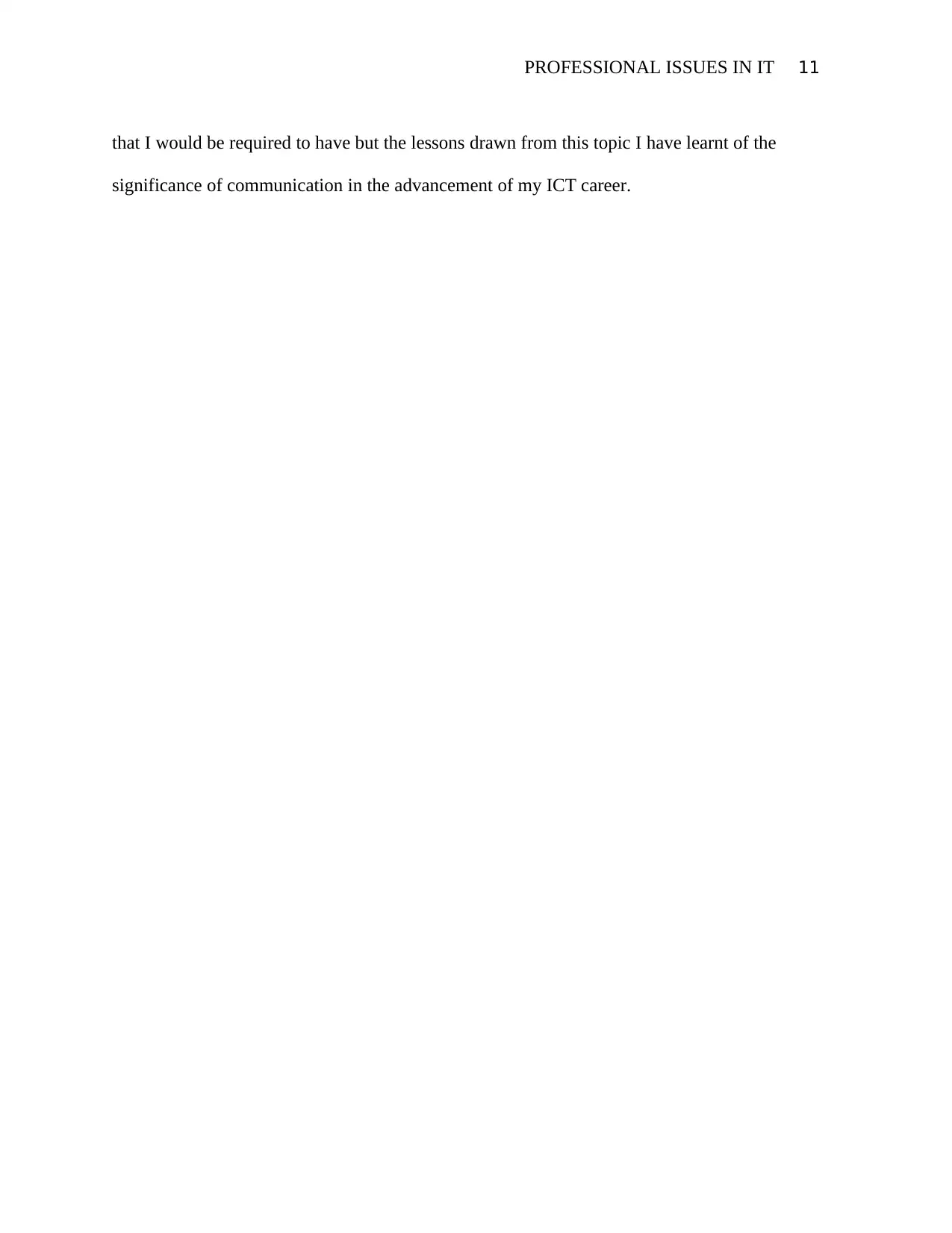
PROFESSIONAL ISSUES IN IT 11
that I would be required to have but the lessons drawn from this topic I have learnt of the
significance of communication in the advancement of my ICT career.
that I would be required to have but the lessons drawn from this topic I have learnt of the
significance of communication in the advancement of my ICT career.
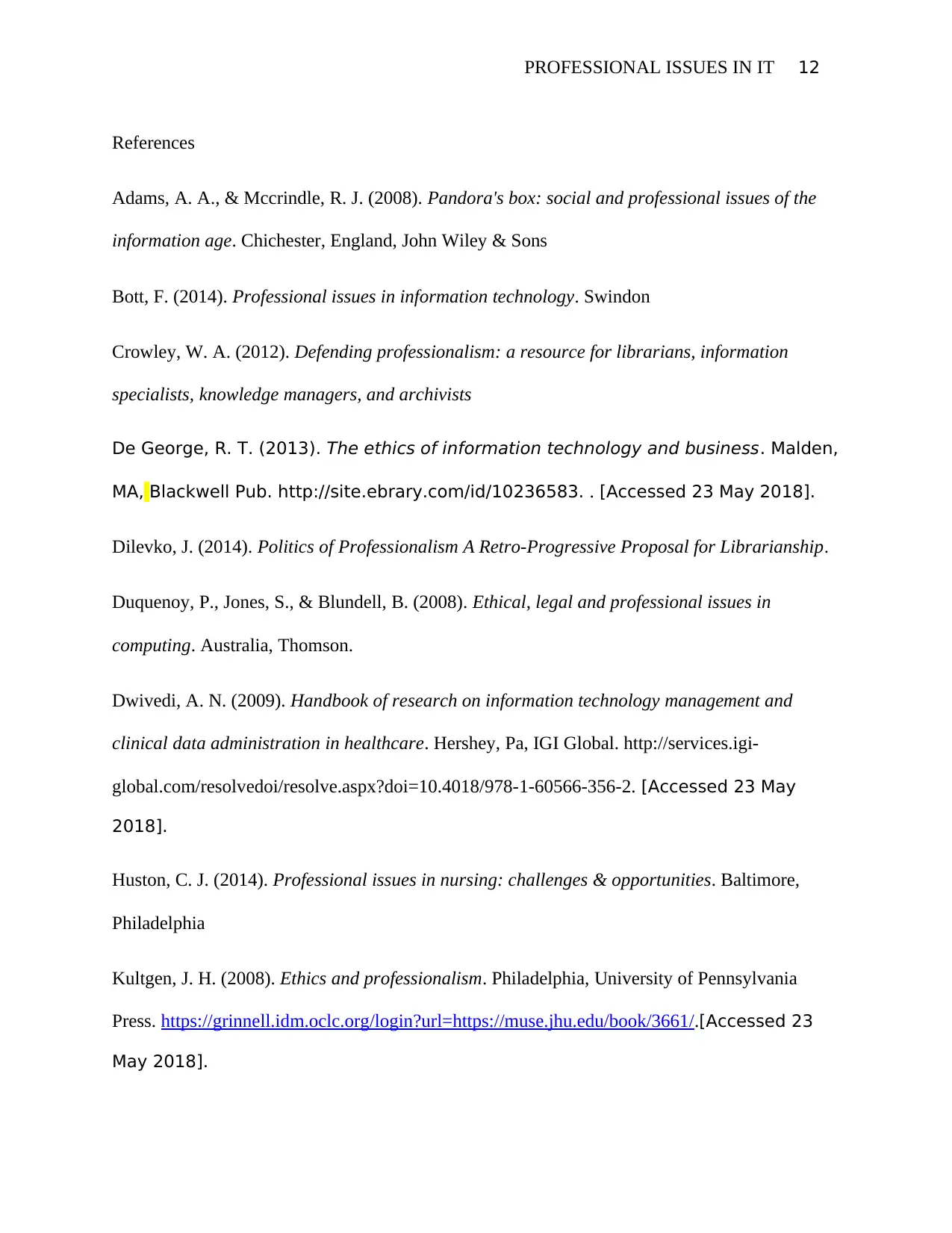
PROFESSIONAL ISSUES IN IT 12
References
Adams, A. A., & Mccrindle, R. J. (2008). Pandora's box: social and professional issues of the
information age. Chichester, England, John Wiley & Sons
Bott, F. (2014). Professional issues in information technology. Swindon
Crowley, W. A. (2012). Defending professionalism: a resource for librarians, information
specialists, knowledge managers, and archivists
De George, R. T. (2013). The ethics of information technology and business. Malden,
MA, Blackwell Pub. http://site.ebrary.com/id/10236583. . [Accessed 23 May 2018].
Dilevko, J. (2014). Politics of Professionalism A Retro-Progressive Proposal for Librarianship.
Duquenoy, P., Jones, S., & Blundell, B. (2008). Ethical, legal and professional issues in
computing. Australia, Thomson.
Dwivedi, A. N. (2009). Handbook of research on information technology management and
clinical data administration in healthcare. Hershey, Pa, IGI Global. http://services.igi-
global.com/resolvedoi/resolve.aspx?doi=10.4018/978-1-60566-356-2. [Accessed 23 May
2018].
Huston, C. J. (2014). Professional issues in nursing: challenges & opportunities. Baltimore,
Philadelphia
Kultgen, J. H. (2008). Ethics and professionalism. Philadelphia, University of Pennsylvania
Press. https://grinnell.idm.oclc.org/login?url=https://muse.jhu.edu/book/3661/.[Accessed 23
May 2018].
References
Adams, A. A., & Mccrindle, R. J. (2008). Pandora's box: social and professional issues of the
information age. Chichester, England, John Wiley & Sons
Bott, F. (2014). Professional issues in information technology. Swindon
Crowley, W. A. (2012). Defending professionalism: a resource for librarians, information
specialists, knowledge managers, and archivists
De George, R. T. (2013). The ethics of information technology and business. Malden,
MA, Blackwell Pub. http://site.ebrary.com/id/10236583. . [Accessed 23 May 2018].
Dilevko, J. (2014). Politics of Professionalism A Retro-Progressive Proposal for Librarianship.
Duquenoy, P., Jones, S., & Blundell, B. (2008). Ethical, legal and professional issues in
computing. Australia, Thomson.
Dwivedi, A. N. (2009). Handbook of research on information technology management and
clinical data administration in healthcare. Hershey, Pa, IGI Global. http://services.igi-
global.com/resolvedoi/resolve.aspx?doi=10.4018/978-1-60566-356-2. [Accessed 23 May
2018].
Huston, C. J. (2014). Professional issues in nursing: challenges & opportunities. Baltimore,
Philadelphia
Kultgen, J. H. (2008). Ethics and professionalism. Philadelphia, University of Pennsylvania
Press. https://grinnell.idm.oclc.org/login?url=https://muse.jhu.edu/book/3661/.[Accessed 23
May 2018].
⊘ This is a preview!⊘
Do you want full access?
Subscribe today to unlock all pages.

Trusted by 1+ million students worldwide
1 out of 14
Related Documents
Your All-in-One AI-Powered Toolkit for Academic Success.
+13062052269
info@desklib.com
Available 24*7 on WhatsApp / Email
![[object Object]](/_next/static/media/star-bottom.7253800d.svg)
Unlock your academic potential
Copyright © 2020–2026 A2Z Services. All Rights Reserved. Developed and managed by ZUCOL.





